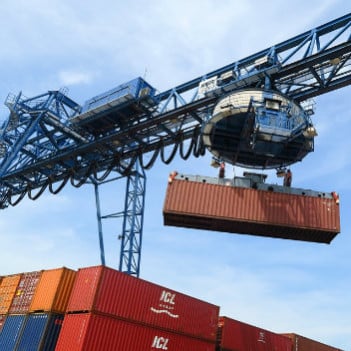When maritime workers suffer offshore injuries in Wisconsin, they often have many questions:
We can help you find answers in a free consultation. Contact us today to learn more about your options.
With shores on both Lake Michigan and Lake Superior, along with a close drive to the Canadian border, Wisconsin’s maritime industry is a major contributor to the state’s economy.
Each year a total of 30 million tons of cargo move through these commercial ports, with goods valued at approximately $2.4 billion. According to a report on the Economic Impact of Wisconsin’s Commercial Ports, these facilities provide 9,550 jobs throughout the state.
While maritime work offers a comfortable middle-class lifestyle, there is always the risk of suffering a serious injury on the job. When this happens, workers can seek compensation through the Jones Act and other maritime laws.
Determining the best avenue for seeking your deserved compensation is no easy task. Moreover, you're likely to face resistance from the insurance companies who are on the hook for paying out your benefits. Let an experienced maritime accident law firm prepare your claim and give you a chance at receiving your maximum compensation.
For more information on offshore accidents, visit: https://legalherald.com/offshore-injury/


Seeking compensation for a maritime work injury differs from other work injuries or personal injury cases. These cases involve the complex field of maritime law and are made at the federal, rather than the state level. The nature of your work duties, your work environment, and the circumstances behind your injury can all influence which specific maritime law applies to your case. Most work injury claims are made under one of two of these laws:
The Jones Act applies to maritime workers who spend at least 30% of their time directly contributing to the function of a vessel on navigable waters. This could include sailors, crew members, offshore oil rig workers, and many others.
Workers covered under the Jones Act are entitled to benefits called maintenance and cure for any work-related injury or illness. “Maintenance” refers to compensation for necessary living expenses like rent and food, while “cure” is compensation for medical care, up until a doctor states that you’ve reached maximum recovery. These benefits do not involve negligence – any work-related injury qualifies for maintenance and cure.
If negligence did play a role in your injury, then you can seek additional compensation by filing a Jones Act lawsuit against your employer. Any failure to keep your work environment safe could constitute negligence. Additionally, vessel owners have a duty to make sure their ships are operating safely and that no dangerous conditions exist. If a vessel owner fails to do this, you can also hold them liable under the concept of unseaworthiness.
Longshore, dock, harbor, and other workers who are not covered by the Jones Act may instead seek compensation in a Longshore and Harbor Workers’ Compensation claim. This is a no-fault form of insurance, which provides compensation for expenses directly related to your injury, including:
These claims are also more complex than land-based workers’ compensation claims because of federal and maritime laws. In order to get through the claims process with few headaches, it’s often necessary to have an experienced maritime injury lawyer on your side.
Wisconsin has a total of 29 ports, including 14 commercial ports and 15 charter/fishing ports. Some of the busiest commercial ports in the state include:
The Port of Milwaukee is capable of handling a variety of cargo types, including steel products, containers, general cargo, roll-on/roll-off vehicles, dry and liquid bulk, and heavy machinery. This port also has links to all major Midwestern cities. In an average year, over 3 million tons of cargo move through the Port of Milwaukee.
The Port of Duluth-Superior is situated on the western most end of Lake Superior and shares waters with Minnesota. It is the largest harbor in the Great Lakes, with over 38 million tons moving through each year (including cargoes that move through the Minnesota side).
The top cargoes handled at this port include:
The Port of Green Bay is located on the western-most point of Lake Michigan. This location allows for direct routes for shipments between Midwest and international markets. Over 2 million tons of cargo move through this port each year. Major cargoes handled include ash, cement, coal, limestone, gypsum, liquid asphalt, and several others.
It’s understandable if you’re worried about finances after suffering a maritime injury in Wisconsin. These injuries can result in high medical bills and extended periods away from work. Fortunately, maritime laws are available to make sure you can support yourself. However, navigating these laws can be complicated.
These claims are usually made against powerful employers and their insurance companies, who have teams of skilled lawyers. In order to give yourself a fair chance at winning against these parties in court, you should strongly consider hiring your own experienced maritime lawyer. Our maritime lawyers have helped maritime workers throughout the United States recover the full compensation they deserve. We can help guide you through each aspect of the process so that you can get the coverage you need while recovering from an injury. To find out more, contact us today for a free consultation.
Continue Reading: Securing Financial Compensation After A Minnesota Maritime Injury

 info@legalherald.com
info@legalherald.com